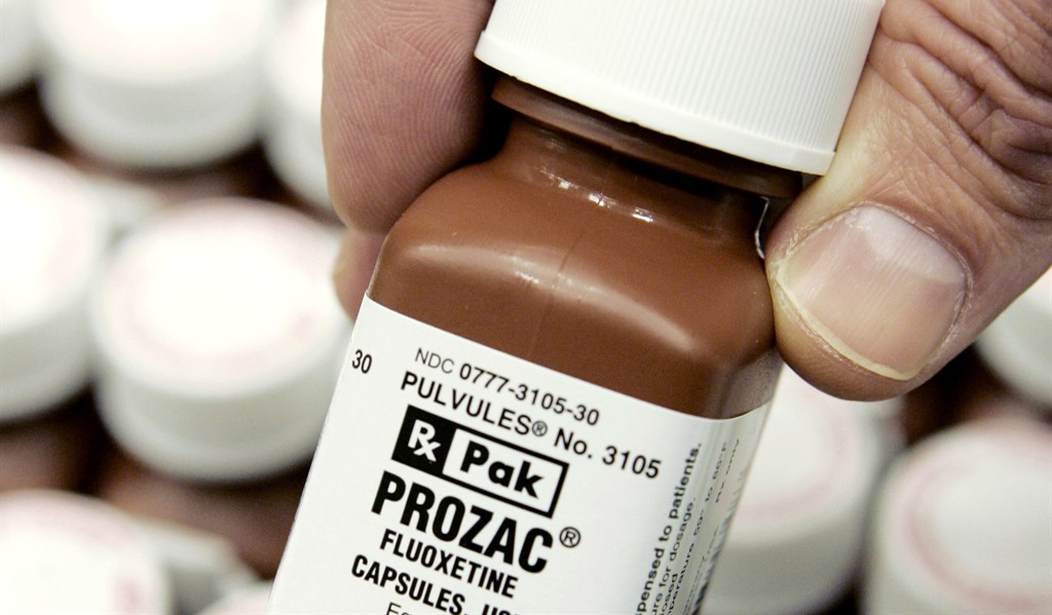Researchers at the University of Portsmouth examined the effects of the active ingredient in popular selective serotonin reuptake inhibitor (SSRI) antidepressant drugs, fluoxetine, on exposed shrimp.
The results were fascinating.
Via National Geographic (emphasis added):
To mimic conditions in the wild, scientists exposed the estuary-dwelling shrimp Echinogammarus marinus to the antidepressant fluoxetine at levels detected in average sewage-treatment waste. Fluoxetine is the key ingredient in the drugs Prozac and Sarafem.
Shrimp normally gravitate toward safe, dark corners. But when exposed to fluoxetine, the animals were five times more likely to swim toward a bright region of water, the team discovered.
“This behavior makes them much more likely to be eaten by a predator, such as a fish or bird,” said study co-author Alex Ford, a biologist at U.K.’s University of Portsmouth.
The fluoxetine likely makes shrimp’s nerves more sensitive to serotonin, a brain chemical known to alter moods and sleep patterns, according to the study…
Ford believes that many other common prescription drugs—such as antiinflammatory drugs and painkillers—could also be causing problems for aquatic life.
SSRIs are among the most commonly prescribed drugs in the United States. Chances are, if you’re reading this from America, one or more of your close friends or family is taking or has taken these drugs in the past.
Via the Centers for Disease Control (CDC), “During 2015–2018, 13.2% of adults aged 18 and over used antidepressant medications in the past 30 days. Use was higher among women (17.7%) than men (8.4%).”
The SSRI prescribing machine is a massive moneymaker for the pharmaceutical firms that market them (and advertise them on television). But their efficacy is more dubious than their profitability.
Recent research, which curiously went largely unreported in the corporate state media when it came out last year, calls into serious question whether serotonin deficiency is actually the root cause of depression, which if proven to be a misguided notion used as the predicate for a multi-billion-dollar profiteering bonanza, should be a scandal approaching the magnitude of the COVID-19 lies pushed by the Public Health™ authorities.
Related: Israel: ‘Vaccine Poster Child’ Used for mRNA Propaganda Dies From Cardiac Arrest
Via Molecular Psychiatry, 2022, (emphasis added):
Our comprehensive review of the major strands of research on serotonin shows there is no convincing evidence that depression is associated with, or caused by, lower serotonin concentrations or activity. Most studies found no evidence of reduced serotonin activity in people with depression compared to people without, and methods to reduce serotonin availability using tryptophan depletion do not consistently lower mood in volunteers. High quality, well-powered genetic studies effectively exclude an association between genotypes related to the serotonin system and depression, including a proposed interaction with stress. Weak evidence from some studies of serotonin 5-HT1A receptors and levels of SERT points towards a possible association between increased serotonin activity and depression. However, these results are likely to be influenced by prior use of antidepressants and its effects on the serotonin system. The effects of tryptophan depletion in some cross-over studies involving people with depression may also be mediated by antidepressants, although these are not consistently found.
Methinks you won’t hear such disclaimers on MSNBC or Fox News when they’re plying their marks to “ask your doctor” about Lexapro or Zoloft.










